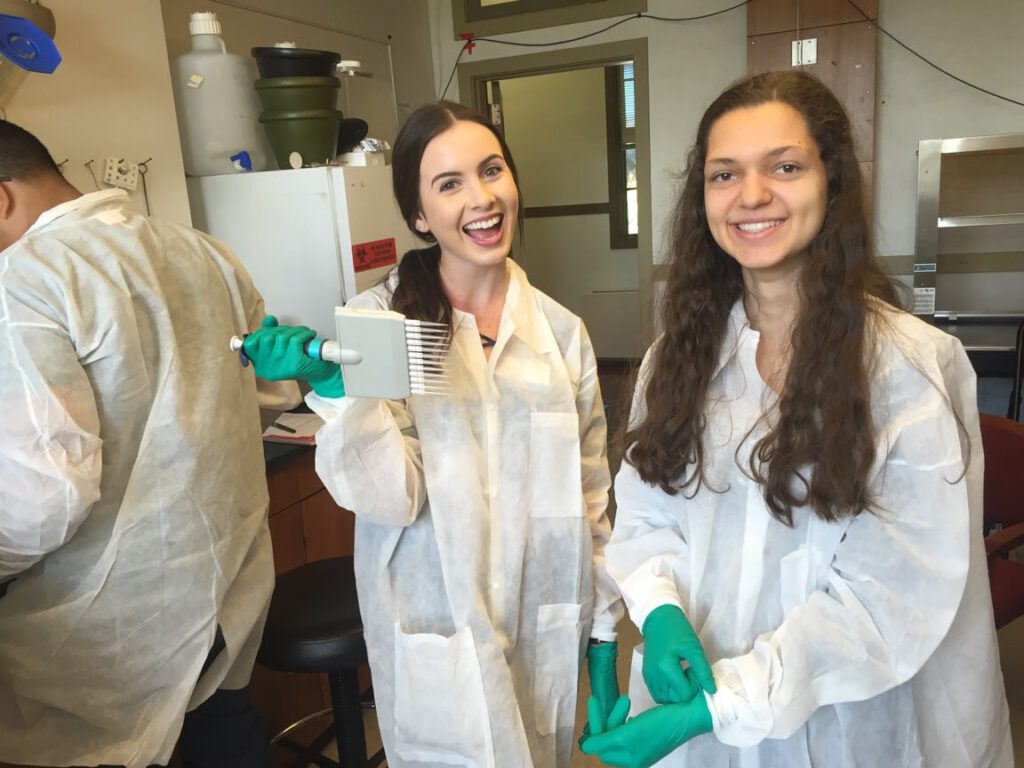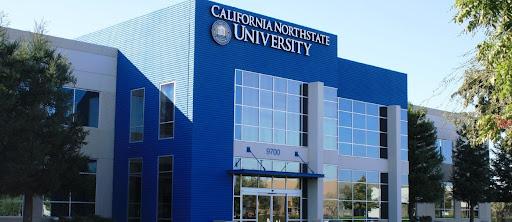Editor’s note: This is another in a series of posts that first appeared in a student quarterly magazine called the DNA Decoder — a magazine written by students, for students. The magazine is designed to help students across the nation connect with each other and share interesting ideas around genetics. We in turn want to share a few of those stories with you on 23andMe’s blog.
By Ava Daniel
In this article, we’ve highlighted some useful tips for how undergraduates can become more involved in genetics and academic research, both at their home institutions and around the country. Knowing how to join a laboratory as a research assistant can be a confusing task, so we’ve provided a comprehensive summary of advantageous steps to take that can make the process easier. Joining a research laboratory is a both a fun and extremely rewarding experience, and we’d love to explain why.
What can Undergraduates Gain from Participating in Laboratory Research?

Ava Daniel, l, and Ann Serbin working in the Tjian Lab at the University of California Berkeley during the summer of 2016.
Exposure to the field of laboratory research. This is a great way to find out if research could be a suitable career choice for you, especially in this era of scientific and technological innovation. Even if you may not foresee yourself working in a lab as a career, many areas of science (ex: medicine, biomedical engineering, technology) may call on you to engage in a lab environment at some point; so, it could only benefit you to get acquainted with even the most basic kinds of research.
Mentorship. A formative mentoring experience will help you to learn hands-on skills that you may not have the opportunity to gain otherwise. Having a mentor can be extremely beneficial for guidance, advice, and even letters of recommendation for your future learning and career opportunities as you progress through university and employment.
Advantages in your different academic science courses. You will be able to personally see the applications of experimental techniques as they pertain to real-life laboratory and clinical uses.
A chance to be involved in groundbreaking research, either by witnessing it firsthand or even participating in it. This gives you the chance to potentially be included as an author on a publication or symposium presentation.
How can I participate in Laboratory Research? Where do I even start?
STEP 1 Try to think about what field of science interests you. Ex: genetics, cell biology, developmental biology, evolutionary biology, endocrinology (hormones), oncology (cancer), immunology (immune system), pathology (diseases), etc.
STEP 2 Try to gain a foundational set of practical skills relevant to laboratory work, if possible. Take a lab course in the type of research you’re interested in (molecular biology, genetics, biochemistry, etc.) or find out if your university offers any “Lab Fundamentals Bootcamps.” While not required, having a set of basic skills and familiarity with lab work will set you apart from other applicants.
STEP 3 Approach instructors and graduate teaching assistants (TAs) in classes that you are especially excited about and ask if there are any research opportunities for undergraduates in their labs (or in other labs they may know of). If you perform well in the course or go out of your way to be especially thoughtful and curious, your teachers will likely be excited to welcome you into their labs.
STEP 4 Look into the labs that are thriving at your university. You can find labs by attending undergraduate journal clubs and/or research talks, doing online research, or talking to professors or TAs that are in the field of study you’re interested in.
You can then see what labs are run under which principal investigators (PIs) (via Google Scholar).
- How many articles have been published?
- How many citations?
- How recent?
If any of those PIs stick out to you, try to read some of their papers to familiarize yourself with the work.
How to Choose a Lab
- Look for a lab with a strong record of welcoming undergraduate students in their research. You can find this out by exploring the lab’s website.
- Search for labs who have graduate students or post-doctoral researchers, as they may be able to answer questions and offer help while you work, or potentially act as mentors to you.
- Consider talking to other students further along in the major you want to pursue and see if they have any research experience or recommendations, either in a lab you want to work in or labs similar to it.
- Asking your peers for advice can be a great first step in identifying what you want to do.
- Keep in mind that any kind of exposure can be beneficial to you. Although your lab of interest may not have openings for research positions right away, ask if you can do some periodic shadowing.
- Continue to check in with the lab to see if anything opens up over time.
- Don’t concern yourself too much about finding the perfect experience, especially right away.
- You will learn over time, and you never know where or when a perfect opportunity may arise.
- Take advantage of the resources already available to students who are looking for research opportunities.
- Many educational programs and departments have staff members who are dedicated to helping students find on-campus research opportunities.
- Take time to identify if there are such staff members in your program and set up an appointment to meet with them to discuss your interests.
How do I contact a lab that I’m really interested in?
Once you’ve narrowed down a lab you are very interested in, reach out to the Principal Investigator (PI) of the lab via email and attach your CV (see below).
If you choose to reach out by email, make sure to show them that you are interested in the specific work that they do by familiarizing yourself with their research, but not repeating the exact wordings from their lab website. Express interest in what you would hope to gain from working in their lab, and in what ways you could contribute to the work they do.
Come off as knowledgeable, informed, and professional. Feel free to reach out to a trusted professor, advisor, or TA to look over the email before you send it.
If at first you don’t succeed, try again! PIs are often very busy traveling and running their lab.
Try to reach out to multiple labs at once and wait to see who contacts you back. This way, you have more options in case something does not work out.
You can try to reach out to individual researchers (graduate students and postdoctoral researchers) within the lab that are not the PI that you may want to personally work with. You can find the contact information of these researchers on the lab’s website, and you can reach out by sending them an introductory email similar to what you sent the PI.
Remember, it is okay to reach out to a PI even if you have no lab experience. Labs are encouraged to be educational spaces, so do not feel intimidated if you have never had prior lab or hands-on science exposure.
What if you do not have access to research opportunities at your university?
At some universities, undergraduate research positions may be few and far between, or you may not find a research lab that peaks your exact interests. Also, it may be possible that your university may not have a strong laboratory science presence.
There are other options for how you can get exposed to laboratory research. For example, you can look into paid summer internship opportunities at the National Institute of Health (NIH), The Broad Summer Research Program (BSRP), Amgen Research Scholars, National Science Foundation (NSF) funded Research Experiences for Undergraduates (REUs), Cold Springs Harbor Undergraduate Research Program, and other similar programs at other universities. These programs may offer you with funding for summer lab internship opportunities, or with alternative ways to apply to separate fellowships or grants that could provide you with funding.
You should start applying to these opportunities as soon as you can, even in your freshman or sophomore years. By experiencing research early, you can make the decision for yourself if you want to continue to pursue it, or spend your time exploring something else. Always remember that you can and should reach out for help! Never be afraid of asking for guidance, recommendations, or general advice from professors, advisors, TAs, and peers in whatever area of study appeals to you. Your undergraduate years are meant for exploration and inquiry, so take advantage of as many resources and opportunities as you can.
Guidelines for a good CV
- Break up your CV into sections:
- Name and contact information
- Experience Summary – brief overview of who you are
- Education – list your institutions, GPA and activities done at each institution
- Experience – describe each relevant work experience, the duration of the work experience, and whether you have a letter of recommendation available
- Honors and Awards – list your awards, prestigious positions, fellowships, etc.
- Skills Summary – list any of your best skills not highlighted in the previous sections
Useful Links
NIH Summer Internship Program (SIP)
The Broad Summer Research Program (BSRP)
NSF Research Experience for Undergraduates
Cold Springs Harbor Undergraduate Research
 Ava Daniel is a sophomore at Yale University majoring in Molecular, Cellular and Developmental Biology. She is a Yale Freshman Research Fellowship recipient and a research assistant at the Yale School of Medicine. Aside from academics, Ava is a Community Health Educator, for which she teaches health education in New Haven public schools, as well as an active mentee of neurosurgery at Yale-New Haven Hospital. She is excited to be a Genetics Education Student Leader and create educational content to inspire students across the country in genetics and other areas of STEM. She is originally from Millbrae, California and hopes to attend medical school after Yale.
Ava Daniel is a sophomore at Yale University majoring in Molecular, Cellular and Developmental Biology. She is a Yale Freshman Research Fellowship recipient and a research assistant at the Yale School of Medicine. Aside from academics, Ava is a Community Health Educator, for which she teaches health education in New Haven public schools, as well as an active mentee of neurosurgery at Yale-New Haven Hospital. She is excited to be a Genetics Education Student Leader and create educational content to inspire students across the country in genetics and other areas of STEM. She is originally from Millbrae, California and hopes to attend medical school after Yale.




